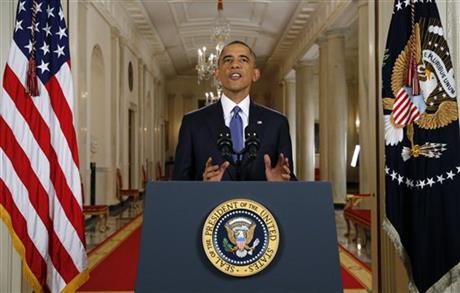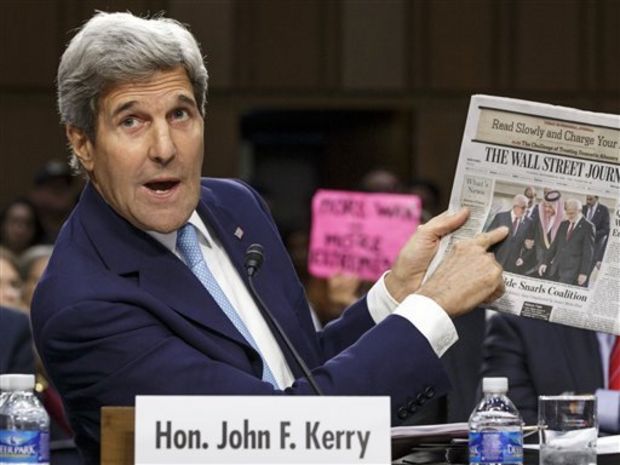

WASHINGTON (AP) — Spurning furious Republicans, President Barack Obama unveiled expansive executive actions on immigration Thursday night to spare nearly 5 million people in the U.S. illegally from deportation and refocus enforcement efforts on “felons, not families.”
The moves, affecting mostly parents and young people, marked the most sweeping changes to the nation’s fractured immigration laws in nearly three decades and set off a fierce fight with Republicans over the limits of presidential powers.
In a televised address to the nation, Obama defended the legality of his actions and challenged GOP lawmakers to focus their energy not on blocking his measures but on approving long-stalled legislation to take their place.
“To those members of Congress who question my authority to make our immigration system work better, or question the wisdom of me acting where Congress has failed, I have one answer: Pass a bill,” Obama said, flexing his presidential powers just two weeks after his political standing was challenged in the midterm elections.
As Obama spoke from the White House, immigration supporters with American flags draped over their shoulders marched on Pennsylvania Avenue outside carrying signs that read, “Gracias, Presidente Obama.”
The address marked the first step in the White House effort to promote the executive actions to the public. On Friday, Obama will speak at a campaign-style rally in Las Vegas.
Despite Obama’s challenge to Republicans to pass a broader immigration bill, his actions and the angry GOP response could largely stamp out those prospects for the remainder of his presidency, ensuring that the contentious debate will carry on into the 2016 elections.
Republicans, emboldened by their sweeping victories in the midterms, are weighing responses to the president’s actions that include lawsuits, a government shutdown and in rare instances, even impeachment.
“The president will come to regret the chapter history writes if he does move forward,” Sen. Mitch McConnell, the Kentucky Republican who is soon to become the Senate majority leader, said before Obama’s address.
House Speaker John Boehner, R-Ohio, who has refused to have his members vote on broad immigration legislation passed by the Senate last year, said Obama’s decision to go it alone “cemented his legacy of lawlessness and squandered what little credibility he had left.”
While Obama’s measures are sweeping in scope, they still leave more than half of the 11 million people living in the U.S. illegally in limbo. The president announced new deportation priorities that would compel law enforcement to focus its efforts on tracking down serious criminals and people who have recently crossed the border, while specifically placing a low priority on those who have been in the United States for more than 10 years.
The president spent months trying to gain a House vote on the Senate bill, frustrating immigration advocates and some Democrats who wanted him to instead take action on his own. While Obama had long insisted that his powers to halt deportations were limited, the White House began seriously exploring options for unilateral action.
Still, that process has been beset by delays, especially Obama’s decision to hold off on announcing the executive orders until after the midterms. Some Democrats had feared that thrusting the immigration debate to the forefront of the campaign would hurt their chances of keeping control of the Senate, though the White House’s delay ultimately did little to stem their defeats.
Obama insisted that his actions did not amount to amnesty.
“Amnesty is the immigration system we have today — millions of people who live here without paying their taxes or playing by the rules, while politicians use the issue to scare people and whip up votes at election time,” he said.
The main beneficiaries of the president’s actions are immigrants who have been in the U.S. illegally for more than five years but whose children are citizens or lawful permanent residents. After passing background checks and paying fees, those individuals will soon be able to seek relief from deportation and get work permits. The administration expects about 4.1 million people to qualify.
Obama is also broadening his 2012 directive that deferred deportation for some young immigrants who entered the country illegally. Obama will expand eligibility to people who arrived in the U.S. as minors before 2010, instead of the current cutoff of 2007, and will lift the requirement that applicants be under 31. The expansion is expected to affect about 300,000 people.
Applications for the new deportation deferrals will begin in the spring. Those who qualify would be granted deferrals for three years at a time.
Immigration-rights activists gathered at watch parties around the country to listen to the president announce actions they have sought for years.
“This is a great day for farmworkers. It’s been worth the pain and sacrifice,” said Jesus Zuniga, a 40-year-old who picks tomatoes in California’s Central Valley and watched the speech at a union gathering in Fresno.
In New York City, however, a couple of protesters held “no amnesty” signs outside a New York union office where advocates of the president’s plan were gathering to watch him and celebrate.
“We have a lot of unemployed Americans right now, and I don’t understand why unemployed Americans can’t be hired to do the jobs these illegals are doing,” said John Wilson, who works in contract management.
The White House insists Obama has the legal authority to halt deportations for parents and for people who came to the U.S. as children, primarily on humanitarian grounds. Officials also cited precedents set by previous immigration executive actions by Democratic and Republican presidents dating back to Dwight Eisenhower.
A senior administration official said the decision to protect parents of citizens or lawful permanent residents is in line with an existing law that allows adult citizens to sponsor their parents for immigration. Obama’s plan goes a step further because the sponsoring citizen doesn’t have to be an adult.
GOP lawmakers disagree with Obama’s claims of legal authority, calling his actions an unconstitutional power grab.
Republicans are weighing a range of responses, including filing legal challenges and using must-pass spending legislation this fall to try to stop Obama’s effort. One lawmaker — Republican Rep. Mo Brooks of Alabama — has raised the specter of impeachment.
GOP leaders have warned against such talk and are seeking to avoid spending-bill tactics that could lead to a government shutdown. They say such moves could backfire, angering many voters and alienating Hispanics for the next presidential election.
___
Associated Press writers Erica Werner, Alicia A. Caldwell, Jim Kuhnhenn, Donna Cassata and Josh Lederman in Washington, Scott Smith in Fresno, California, and Jennifer Peltz in New York City contributed to this report.



